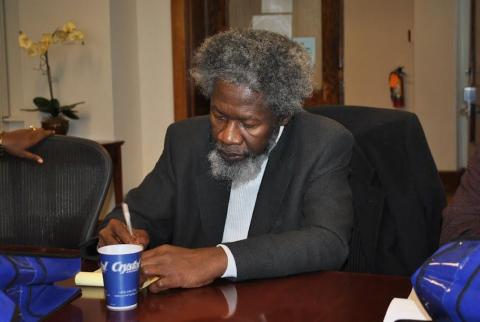First open heart surgery was performed in Enugu, Igboland, not in Ibadan By Professor Herbert Ekwe-Ekwe

From freeing Nigeria to open-heart surgeries
Contrary to Sola Ogundipe’s claims in “UCH performs 1st open heart surgery” (Vanguard, Lagos, 15 October 2013), the first open heart-surgery in this part of west Africa was actually performed at the Nsukka University Teaching Hospital, Enuugwu, Igboland, on 1 February 1974, four years and just over a month to the day after the formal end of the 44-month long Igbo genocide. The surgeons who worked on this surgery included C.H. Anyanwu, F.A. Udekwu, D.C. Nwafor and M. Yacoub. In the subsequent 26 years, i.e., by 2000, a total of 102 (one hundred and two) open heart-surgeries were performed in this Enuugwu centre. Currently, Professor Martin Aghaji of the centre is one of Africa's leading cardiologists. It should be added that Professor Aghaji is brother to Professor Alloysius Aghaji, also a leading surgeon himself, in urology, who most sadly died in an accident at his home (in Enuugwu) in August 2009.
Writing in July 2004, the commentator Sabella Ogbobode Abidde makes the following observation:
"The Igbo nation ha[s] attributes most other Nigerian nationalities can only dream of and are what most other nations [are] not. The Igbo made Nigeria better. Any wonder then that the Igbo can do without Nigeria; but Nigeria and her myriad nationalities cannot do without the Igbo? Take the Igbo out of the Nigeria equation … and Nigeria will be gasping for air."
Abidde can’t be more emphatic in summarising this feature of the Igbo mission in the past one-half of a century or thereabout. For the Igbo, prior to 29 May 1966, i.e., the day that the Nigeria state launched the Igbo genocide, the foundational genocide of post-(European)conquest Africa in which 3.1 million Igbo were murdered during the course of 44 months, three important holidays were high up on their annual calendar: the Igbo National Day, the iri ji or the New Yam Festival, and 1 October. The latter was the day of celebration for the restoration of independence for peoples in Nigeria after 60 years of the British conquest and occupation. Or, so were the thoughts predicated on this date’s designation.
The Igbo were one of the very few constituent nations in what was Nigeria, again prior to 29 May 1966, who understood, fully, the immense liberatory possibilities ushered in by 1 October and the interlocking challenges of the vast reconstructionary work required for state and societal transformation in the aftermath of foreign occupation. The Igbo had the most robust economy in the country in their east regional homeland, supplied the country with its leading writers, artists and scholars, supplied the country’s top universities with its vice-chancellors and leading professors and scientists, supplied the country with its first indigenous university (the prestigious university at Nsukka where the open-heart began), supplied the country with its leading and most spirited African World theorists, philosophers and practitioners, supplied the country with its top diplomats, supplied the country’s leading high schools with its head teachers and administrators, supplied the country with its top bureaucrats, supplied the country with its leading businesspeople, supplied the country with an educated, top-rated professional officers-corps for its military and police forces, supplied the country with its leading sportspersons, essentially and effectively worked the country’s rail, postal, telegraphic, power, shipping and aviation services to quality standards not seen since in Nigeria … And they were surely aware of the vicissitudes engendered by this historic age precisely because the Igbo nation played the vanguardist role in the freeing of Nigeria from Britain, beginning from the mid-1930s.
Typified by this recent, blazingly-staggering effort to deny or distort the history of open-heart surgery in the west Africa region, it is clear that Igbo success, Igbo march in history, Igbo resilience, Igbo thrust, call it anything, is quite a problem for some people – and this is an understatement, one should stress! This accounts for one of the fuelling features of the unrelenting genocide. Igbo surely know that they cannot continue to coexist with this torrent of hate and hostility. It is indeed existential. No doubt about it…
Prof Herbert Ekwe Ekwe is visiting professor in graduate programme of constitutional law at Universidade de Fortaleza, Brazil. He specialises on the state and on genocide and wars in Africa in the post-1966 epoch, beginning with the Igbo genocide, 29 May 1966-12 January 1970, the foundational and most gruesome genocide of post-(European)conquest Africa. Among his books are African Literature in Defence of History: An Essay on Chinua Achebe (Michigan State University Press, 2001); Issues in Nigerian Politics since the Fall of the Second Republic 1984-1990 (Edwin Mellen Press, 1992), Biafra Revisited (African Renaissance, 2006) and Readings from Reading: Essays on African Politics, Genocide, Literature (African Renaissance, 2011).
